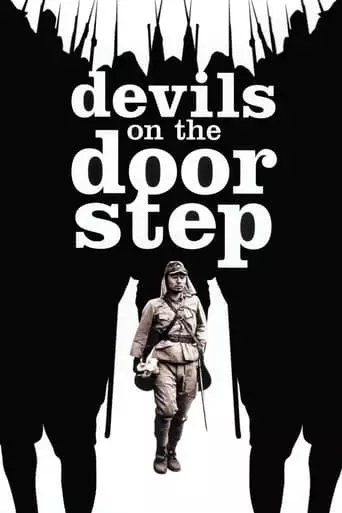During the Japanese occupation of China, two prisoners are dumped in a peasant’s home in a small town. The owner is bullied into keeping the prisoners until the next New Year, at which time they will be collected. The village leaders convene to interrogate the prisoners. The townspeople then struggle to accommodate the prisoners. One is a bellicose Japanese nationalist, the other a nervous translator. Will the townspeople manage to keep the prisoners until the New Year?
Set in 1944-45, during the last years of the Second Sino-Japanese War, Devils on the Doorstep (original title: Guizi laile) tells the darkly comedic and tragic story of Ma Dasan, a peasant living in a rural Chinese village. The villagers are caught between the Japanese occupation forces and the Chinese resistance. The film begins with Ma being forced to house two prisoners— a Japanese soldier, Kosaburo Hanaya, and his Chinese interpreter, Dong Hanchen—who are dumped at his doorstep by a Chinese collaborator. Ma’s life is turned upside down as he must keep them under house arrest until they are to be picked up on New Year’s Eve. However, as time passes, Ma is unable to figure out what to do with these prisoners. No help arrives from the resistance, and the villagers begin to grow increasingly paranoid, with no clear direction or leadership.
The film unfolds in a surreal way, blending black comedy with deeply disturbing moments. As Ma struggles to understand his role in the situation, his own fears and those of the villagers intensify. The backdrop of impending Japanese defeat adds a layer of dramatic irony, as the villagers, despite their growing resentment of their captives, begin to recognize that they may be caught between larger forces beyond their control.
Themes and Analysis:
- Moral Ambiguity and Fear: A central theme of the film is the exploration of fear and its corrupting influence on human nature. The villagers, who are initially caught in an oppressive war, are thrust into a situation where their moral choices are compromised by the terror they feel. Fear, whether of the Japanese forces or of their own weaknesses, causes them to act in ways that challenge notions of good and evil. This moral ambiguity is expressed through dark humor, where characters who might seem like “heroes” in other narratives reveal their own cowardice and flaws.
- The Absurdity of War: Jiang Wen uses absurd humor to confront the brutality and absurdity of war. The film is not a typical anti-war movie, but rather it questions the nature of war itself—its randomness, its senselessness, and the toll it takes on ordinary people. The juxtaposition of humorous situations with moments of intense violence underscores the tragic absurdity of the human experience in wartime.
- Chinese National Identity and Resistance: While Devils on the Doorstep is set during a period of intense anti-Japanese sentiment, it does not present a straightforward heroic narrative of Chinese resistance. Instead, the film highlights the weaknesses of the Chinese people, focusing on a small village that is largely ignorant of the larger political and military struggles. This reflects a critique of both Chinese nationalism and the myth of heroic resistance.
- Survival and Dehumanization: The prisoners, despite being captives, are not portrayed as simple villains. Both the Japanese soldier and the Chinese translator are caught in a cycle of survival and are subjected to dehumanization, just like the peasants. The film raises questions about how war strips away the humanity of all parties involved, leading to violence and suffering.
- Ironic Death and Fate: The film’s ending is steeped in irony, particularly the death of Ma Dasan, which coincides with Japan’s surrender. This tragic moment underlines the futility of Ma’s struggle and how history’s larger events can obscure personal tragedies. His desire for death, symbolizing his own escape from fear and moral confusion, becomes an ironic reflection of the larger historical outcome.
10 Reasons to Watch:
- Unique Perspective on WWII: Unlike traditional war films that focus on heroism and patriotism, Devils on the Doorstep offers a darker, more ironic view of war, focusing on ordinary people caught in the chaos.
- Masterful Blend of Comedy and Tragedy: The film expertly combines absurd humor with poignant moments, making it an emotionally complex experience.
- Rich, Multi-layered Storytelling: The narrative weaves together themes of fear, cowardice, and the consequences of war, offering a deep psychological and moral exploration.
- Stunning Cinematography: The black-and-white cinematography enhances the film’s stark, raw portrayal of wartime China.
- Powerful Performances: The cast, led by Jiang Wen, delivers deeply human and relatable portrayals of characters in extreme situations.
- Historical Reflection: The film invites viewers to reflect on China’s historical trauma during the Japanese occupation and the moral dilemmas faced by ordinary citizens.
- Complex, Multi-Dimensional Characters: The characters are not simple heroes or villains, but complex figures shaped by the wartime context.
- International Acclaim: The film won the Grand Prix at the Cannes Film Festival, demonstrating its global recognition as a significant work of cinema.
- Controversial Themes: The film pushes boundaries by presenting uncomfortable truths about war and nationalism, which led to it being banned in China for its critical portrayal of national identity
- Engaging Narrative Structure: The film’s narrative structure, which starts with comedy and builds to intense drama, keeps viewers engaged and forces them to confront uncomfortable truths.
Emotional Impact After Watching:
After viewing Devils on the Doorstep, viewers may experience a range of emotions. The film’s blending of dark humor with moments of stark tragedy may leave you feeling unsettled, particularly as the absurdity of war is laid bare. You may find yourself reflecting on the dehumanizing effects of fear and the arbitrary nature of fate. The film challenges conventional notions of heroism and forces the audience to grapple with uncomfortable questions about human nature and the realities of war. Ultimately, the emotional impact is one of mixed contemplation, where the humor and tragedy linger long after the credits roll

